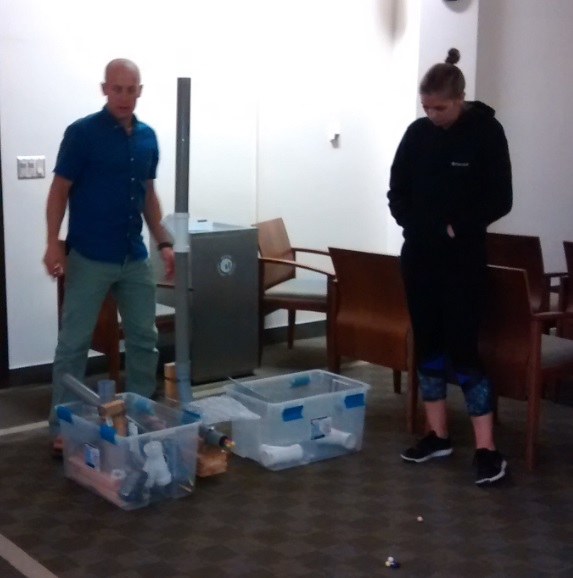Friday Flyer - April 19, 2019

Spotlight on the Syracuse University QuarkNet Center
Steven Blusk and Matt Rudolph hosted a three-day workshop in August 2018. The first part of the workshop focused on neutrinos; Professor Blusk talked about neutrinos and their detection. Michael Madden, one of the teachers, led activities found on the Neutrinos in the Classroom site (http://neutrino-classroom.org/), including an activity which uses conservation of momentum that was the basis for this year's MINERvA masterclass measurement. On day two, teachers assembled a set of demonstrations that simulate particle collisions between nuclei using PVC pipe, spherical magnets and marbles, as shown below. During the remaining workshop time, teachers worked in groups to create and share lessons based on modern physics concepts and applications. Also, they toured several labs including biophysics, astrophysics, and high-energy physics.


News from QuarkNet Central
After more than 320 individual masterclass institutes around the world—a record number, by the way—International Masterclasses 2019 has come to an end. Thanks to everyone involved for making this such a successful season. We look forward to International Masterclasses 2020!
A reminder for teachers: We have been recruiting for QuarkNet Data Camp, to be held at Fermilab, July 14–19. Data Camp is our national flagship workshopt, and if you have not gone yet, you should throw your hat in the ring. Data Camp participants are nominated by mentors (1–2 per center), so, if you are interested, let your mentor know. Learn more from the Data Camp flyer.

Physics Experiment Roundup
Last week's FF spotlight was on the black hole image recently released by the Event Horizon Telescope collaboration. Science Friday seeks to answer the question, "So now what?" On the topic of black holes, gravitational wave detectors LIGO and Virgo recently turned back on and have since discovered two more potential black hole mergers within one week. At the LHC, check out the new "cool" way to transport electricity.

Resources
What does supercooled liquid water have to do with dark matter detection? Find out! Symmetry explores the possibility of detecting dark matter with gravitational wave detectors like LIGO. If you want to learn more about the Deep Underground Neutrino Experiment (DUNE), then check out this lecture, recorded at Fermilab earlier this month.

Just for Fun
Nine-year-old Global Scientific Ambassador to CERN Romanieo Golphin, Jr. makes an appearance on TV where he does a few of his favorite demos and talks of his trip to Fermilab. And finally, here's a sign of spring at Fermilab that might surprise you.
QuarkNet Staff:
Mark Adams: adams@fnal.gov
Ken Cecire: kcecire@nd.edu
Shane Wood: swood5@nd.edu
